Leviticus 21 meaning explained in AI Summary
Priestly Standards and Holiness
- Maintaining Priestly Purity: This chapter establishes specific standards for priests regarding their physical condition and personal conduct. These standards aimed to ensure that priests maintained a high level of ritual purity and holiness as they served in the tabernacle.
- Physical Imperfections and Priestly Roles: Certain physical imperfections, such as blindness or lameness, disqualified individuals from serving as high priests. However, they could still serve in lesser priestly roles. This suggests a balance between maintaining high standards and inclusivity.
- Priestly Marriages: Restrictions were placed on whom priests could marry. They were forbidden from marrying women considered ritually impure, such as those who had been prostitutes or divorced. This ensured the purity of the priestly lineage.
This chapter outlines the specific regulations for priests, emphasizing their elevated status and the need for ritual purity in their service to God.
Key Points:
- Restrictions on Contact with the Dead (vv. 1-4): Priests are forbidden from contact with the dead, except for immediate family members. This highlights their dedication to life and God's holiness.
- Physical Imperfections (vv. 16-23): Priests with specific physical blemishes are prohibited from performing certain duties, particularly approaching the altar. This emphasizes the importance of wholeness and perfection in God's presence.
- Marriage Regulations (vv. 7-15): Priests are held to higher standards regarding marriage. They must marry Israelite virgins or widows of priests, maintaining the purity of the priestly lineage.
- Aaron's Descendants (vv. 24): The chapter reiterates that only the male descendants of Aaron can serve as priests, emphasizing the importance of lineage and God's chosen people.
Overall Theme:
Chapter 21 emphasizes the sacred role of priests as intermediaries between God and the Israelites. Their elevated status comes with strict regulations regarding purity, marriage, and physical wholeness, reflecting the sanctity of their service and the holiness of God.
Leviticus 21 bible study ai commentary
The regulations in Leviticus 21 establish a heightened standard of holiness for the Aaronic priests, who served as mediators between God and Israel. These laws govern their conduct regarding death, marriage, and physical wholeness. The priest's life was to be a living sermon, a public display of the sanctity, order, and life-giving perfection of the God they served. Every regulation was designed to set them apart from the people and from the defiling or chaotic practices of surrounding pagan cultures, thereby preserving the purity of God's presence in the sanctuary. These impossibly high standards ultimately foreshadow the necessity of Jesus Christ, the one truly perfect High Priest.
Leviticus 21 Context
The setting is post-exodus, at the foot of Mount Sinai, where God is establishing the laws for the newly consecrated Tabernacle worship system. Culturally, in the Ancient Near East (ANE), priests were expected to maintain ritual purity. Physical perfection was often seen as a prerequisite for serving the gods, as blemishes were considered omens or signs of divine disfavor. Mourning rituals in Canaan and Mesopotamia often involved extreme acts like gashing the body, shaving the head and beard, and engaging with the dead, which Israel's laws directly counteract. These regulations created a priesthood radically focused on life and wholeness in direct opposition to the death-cults of their neighbors.
Leviticus 21:1-4
"And the LORD said to Moses, “Speak to the priests, the sons of Aaron, and say to them, ‘No one shall make himself unclean for the dead among his people, except for his closest relatives, his mother, his father, his son, his daughter, his brother, or his virgin sister (who is near to him because she has had no husband; for her he may make himself unclean). He shall not make himself unclean as a husband among his people and so profane himself.’"
In-depth-analysis
- Targeted Command: The law is specifically for the "priests, the sons of Aaron," distinguishing them from the general populace.
- Defilement by Death: Contact with a corpse (nephesh, meaning soul, person, or body) was a primary source of ritual impurity. For priests, who ministered in the realm of life and holiness, this contact was severely restricted. Death is the ultimate consequence of sin (Rom 6:23), and the priest had to remain separated from its powerful defilement.
- Concession for Family: The law acknowledges deep familial bonds and allows a priest to participate in mourning for his immediate blood relatives: mother, father, son, daughter, brother, and a virgin sister who still belongs to the father's house.
- Ambiguous Phrase: Verse 4, "He shall not make himself unclean as a husband among his people," is debated. It could mean he should not defile himself for his wife's relatives or that, as a leader (ba'al can mean chief/master), he should not defile himself for ordinary members of the community, reinforcing his separation. The context favors the latter. A wife was considered "one flesh" and defilement for her was assumed.
Bible references
- Eze 44:25: "They shall not defile themselves by going near to a dead person. But for father or mother, for son or daughter, for brother or unmarried sister they may defile themselves." (Eschatological Priestly Law)
- Lev 10:6-7: "Do not let the hair of your heads hang loose, and do not tear your clothes... But your brothers, the whole house of Israel, may bewail the burning that the LORD has kindled." (Priests' strict mourning after Nadab/Abihu)
- Num 19:11: "Whoever touches the dead body of any person shall be unclean for seven days." (General law of corpse defilement)
Cross references
Deut 14:1 (prohibited mourning); Num 6:6-7 (Nazirite vow on defilement); Hag 2:13 (defilement via touch); 1 Th 4:13 (Christian grief with hope).
Leviticus 21:5-6
"They shall not make bald patches on their heads, nor shave off the edges of their beards, nor make any cuts on their body. They shall be holy to their God and not profane the name of their God. For they offer the LORD’s food offerings, the food of their God, and so they must be holy."
In-depth-analysis
- Body Integrity: These prohibitions directly target Canaanite and pagan mourning practices, which involved disfigurement as a plea to underworld deities. The priest's body was consecrated to God and was not to be marred.
- Reason for Holiness: The rationale is explicitly stated: "For they offer the LORD's food offerings." The priest handles the "bread of God" (lechem 'Elohim). His external state must reflect the internal holiness of his task. His body becomes a symbol of the wholeness God desires.
- Profaning the Name: To adopt pagan mourning rituals would profane God’s name by associating Him with pagan gods and their realms of death and chaos.
Bible references
- Deut 14:1: "You are the sons of the LORD your God. You shall not cut yourselves or make any baldness on your foreheads for the dead." (General prohibition for all Israel)
- 1 Kgs 18:28: "And they cried aloud and cut themselves after their custom with swords and lances, until the blood gushed out upon them." (Baal prophets' ritual)
- Heb 12:14: "Strive for peace with everyone, and for the holiness without which no one will see the Lord." (NT call to holiness)
Cross references
Lev 19:27-28 (general prohibition); Jer 16:6 (pagan mourning); Mic 1:16 (shaving head as judgment sign).
Polemics
This is a direct polemic against the cult of Baal and other regional deities whose priests engaged in ecstatic and self-mutilating rituals. Israel's priesthood was to be characterized by order, solemnity, and physical integrity, mirroring the nature of Yahweh. The body of the priest itself becomes a testament against paganism.
Leviticus 21:7-9
"They shall not marry a prostitute or a woman who has been defiled, nor shall they marry a woman divorced from her husband, for the priest is holy to his God. You shall sanctify him, therefore, for he offers the food of your God. He shall be holy to you, for I, the LORD, who sanctify you, am holy. And the daughter of a priest, if she profanes herself by whoring, profanes her father. She shall be burned with fire."
In-depth-analysis
- Marriage as a Statement: The priest's marriage was not a private affair. His household was an extension of his ministry. Marrying a woman with a history of sexual impurity or a broken covenant (divorce) would compromise his symbolic representation of God’s covenantal faithfulness.
- Corporate Responsibility: Israel ("You shall sanctify him") is commanded to treat the priest as holy, respecting his unique status because he handles holy things. This status is derived from God ("I, the LORD... am holy").
- Severity for a Priest's Daughter: The penalty for a priest's daughter engaging in prostitution is death by fire. This is not because her sin is worse, but because its impact is greater. She not only sins but also "profanes her father," thereby desecrating the holy lineage and bringing public shame upon God's representative. The severity underscores the gravity of desecrating the priesthood.
Bible references
- Hos 1:2: "Go, take to yourself a wife of whoredom..." (God commands Hosea to embody Israel's infidelity)
- Eph 5:25-27: "Christ loved the church and gave himself up for her... that he might present the church to himself in splendor, without spot or wrinkle..." (The church as Christ's pure bride)
- 1 Tim 3:2: "Therefore an overseer must be above reproach, the husband of one wife..." (Leadership qualifications in the church)
Cross references
Deut 22:21 (punishment for promiscuity); Eze 44:22 (future priest marriage rules); Gen 38:24 (Tamar sentenced to be burned).
Leviticus 21:10-12
"‘The priest who is chief among his brothers, on whose head the anointing oil has been poured and who has been consecrated to wear the garments, shall not let his hair hang loose or tear his clothes. He shall not go near any dead body, nor make himself unclean, even for his father or for his mother. He shall not go out of the sanctuary or profane the sanctuary of his God, for the consecration of the anointing oil of his God is on him: I am the LORD."
In-depth-analysis
- The High Priest's Standard: The holiness requirements are elevated for the High Priest (ha'kohen ha'gadol). He represents the pinnacle of human mediation.
- Absolute Prohibition from Death: Unlike regular priests, the High Priest cannot defile himself even for his own parents. His commitment to the sanctuary and the presence of God supersedes the deepest of human obligations.
- Bound to the Sanctuary: The reason is the "consecration of the anointing oil." He is permanently marked as belonging to the sacred sphere. Leaving the sanctuary for mourning would be to "profane" it—to treat the holy space as common by leaving it for a defiling purpose. He is a living part of the sanctuary's furniture.
Bible references
- Heb 7:26-27: "For it was fitting that we should have such a high priest, holy, innocent, unstained, separated from sinners... He has no need, like those high priests, to offer sacrifices daily..." (Christ as the perfect High Priest)
- Exod 29:7: "Then you shall take the anointing oil and pour it on his head and anoint him." (Aaron's original anointing)
- Lev 10:7: "...you shall not go out from the entrance of the tent of meeting, lest you die, for the anointing oil of the LORD is upon you." (Rule given to Aaron and his sons)
Cross references
Exo 28:36 (golden plate: "Holy to the Lord"); Num 35:25 (manslayer freed on High Priest's death); Heb 4:14-15 (Jesus as High Priest).
Leviticus 21:13-15
"And he shall take a wife in her virginity. A widow, or a divorced woman, or a woman who has been defiled by prostitution, these he shall not marry. But he shall take a virgin from his own people as his wife, that he may not profane his offspring among his people, for I am the LORD who sanctifies him.’”
In-depth-analysis
- Stricter Marriage Rule: The High Priest's marital restrictions are stricter than a regular priest's. He must marry a virgin.
- From his Own People: The wife must also be an Israelite ("from his own people"). This ensures undivided loyalty and prevents the introduction of foreign religious practices at the very top of Israel's worship system.
- Purity of Offspring: The stated purpose is to "not profane his offspring." The line of the High Priest had to be maintained in a state of maximum purity, as it was from this line that future High Priests would come. It's about maintaining a lineage of symbolic wholeness.
Bible references
- Eze 44:22: "They shall not marry a widow or a divorced woman, but only virgins of the offspring of the house of Israel..." (Future priestly rules echoing this)
- 2 Cor 11:2: "For I feel a divine jealousy for you, since I betrothed you to one husband, to present you as a pure virgin to Christ." (The church's ideal purity)
- Rev 14:4: "It is these who have not defiled themselves with women, for they are virgins. It is these who follow the Lamb wherever he goes." (Symbolic purity of the 144,000)
Cross references
Gen 24:3-4 (Abraham seeking a wife for Isaac from their own people); Deut 7:3-4 (warning against intermarriage).
Leviticus 21:16-24
"And the LORD spoke to Moses, saying, 'Speak to Aaron, saying, None of your offspring throughout their generations who has a blemish shall approach to offer the food of his God... a man who is blind or lame, or one who has a mutilated face or a limb too long... for he has a blemish. He shall not come near to offer the food of his God... He may eat the food of his God... only he shall not go near the veil or approach the altar, because he has a blemish, that he may not profane my sanctuaries, for I am the LORD who sanctifies them.' So Moses spoke to Aaron and to his sons and to all the people of Israel."
In-depth-analysis
- Symbolic Perfection: This rule is not about personal worthiness or discrimination but about symbolic representation. The sacrificial animals had to be without blemish (Lev 22:19-20). The one offering the perfect sacrifice must also be physically whole to maintain the symbol of perfection and wholeness that God represents.
- God’s Gracious Provision: Crucially, a priest with a blemish was not excommunicated. He was still part of the priestly family and provided for: "He may eat the food of his God, both of the most holy and of the holy things." This distinguishes his value as a person from his ritual function.
- Disqualified from Function, Not Family: The restriction was specific: he could not "approach the altar" or "go near the veil." His role as a public mediator at the point of sacrifice was forbidden, but his identity as a son of Aaron was intact.
- Christ, the Unblemished Priest: This long list of imperfections highlights the impossibility of a perfect human priesthood and points powerfully to Jesus, our High Priest who is "holy, innocent, unstained" (Heb 7:26) and the perfect "lamb without blemish or spot" (1 Pet 1:19).
Bible references
- Heb 7:26: "For it was fitting that we should have such a high priest, holy, innocent, unstained, separated from sinners..." (Jesus as the unblemished High Priest)
- 1 Pet 1:19: "...but with the precious blood of Christ, like that of a lamb without blemish or spot." (Christ as the unblemished sacrifice)
- Lev 22:20-22: "You shall not offer anything that has a blemish, for it will not be acceptable for you." (Requirement for sacrifices)
- Eph 5:27: "...that he might present the church to himself in splendor, without spot or wrinkle or any such thing..." (The church as the perfected Body of Christ)
Cross references
Deut 15:21 (blemished animals); 2 Sam 5:8 (lame and blind not to enter the house); Mal 1:8 (rebuke for offering blemished animals); Luke 14:21 (parable of inviting the poor, crippled, blind, lame).
Leviticus chapter 21 analysis
- The Principle of Representative Holiness: The priest does not generate his own holiness; he reflects God's holiness. His body, his family, and his actions are public symbols. Any imperfection in the symbol (physical blemish, defiling marriage, contact with death) compromises the message about the God he represents.
- Life, Order, and Wholeness: The entire chapter builds a theology where God is associated with life (vs. death), order (vs. pagan chaos), and wholeness (vs. brokenness/blemish). The priesthood was to embody these divine characteristics.
- A Typological Framework for Christ: The Aaronic priesthood, with its inherent flaws and impossible standards, serves as a powerful type, or foreshadowing, of Christ. Every rule a priest might break highlights a way in which Christ is perfect.
- They are defiled by death; Christ conquers death.
- They have physical blemishes; Christ is physically and spiritually perfect.
- They must marry a pure virgin; Christ's bride, the Church, is being purified for Him.
- Their service is temporary and symbolic; Christ's is eternal and effective.
- God's Grace within the Law: Even within these strict laws, God's grace is evident. The blemished priest is not cast out but is still provided for from the holy offerings, showing he is still part of the covenant family. His intrinsic worth is not diminished, though his function is limited.
Leviticus 21 summary
This chapter details the heightened purity regulations for Israel's priests and High Priest. To serve as mediators representing a perfectly holy God, they were required to maintain physical wholeness, avoid defilement from death, and adhere to strict marital laws. These demanding standards symbolically distinguished them from pagan practices and ultimately foreshadowed the coming of Jesus Christ, the one perfect, unblemished, and eternal High Priest.
Leviticus 21 AI Image Audio and Video

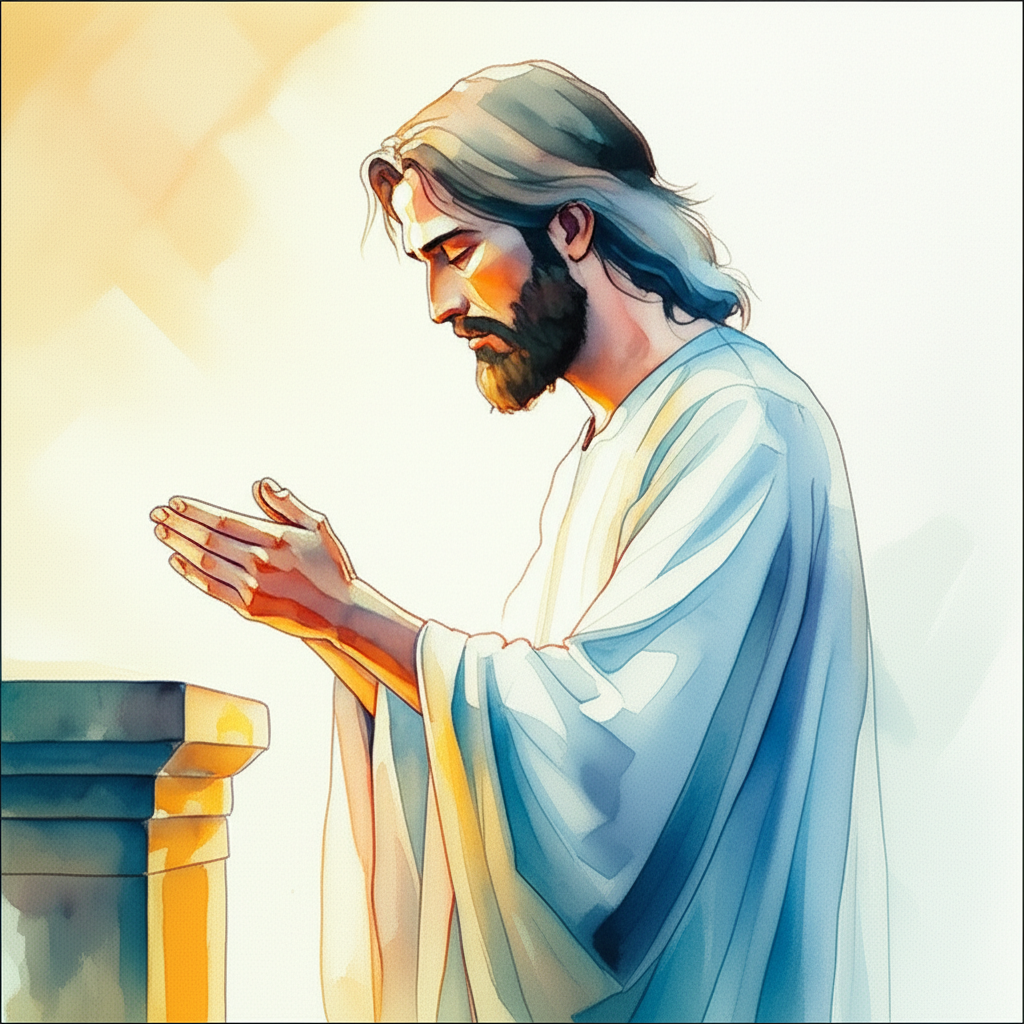
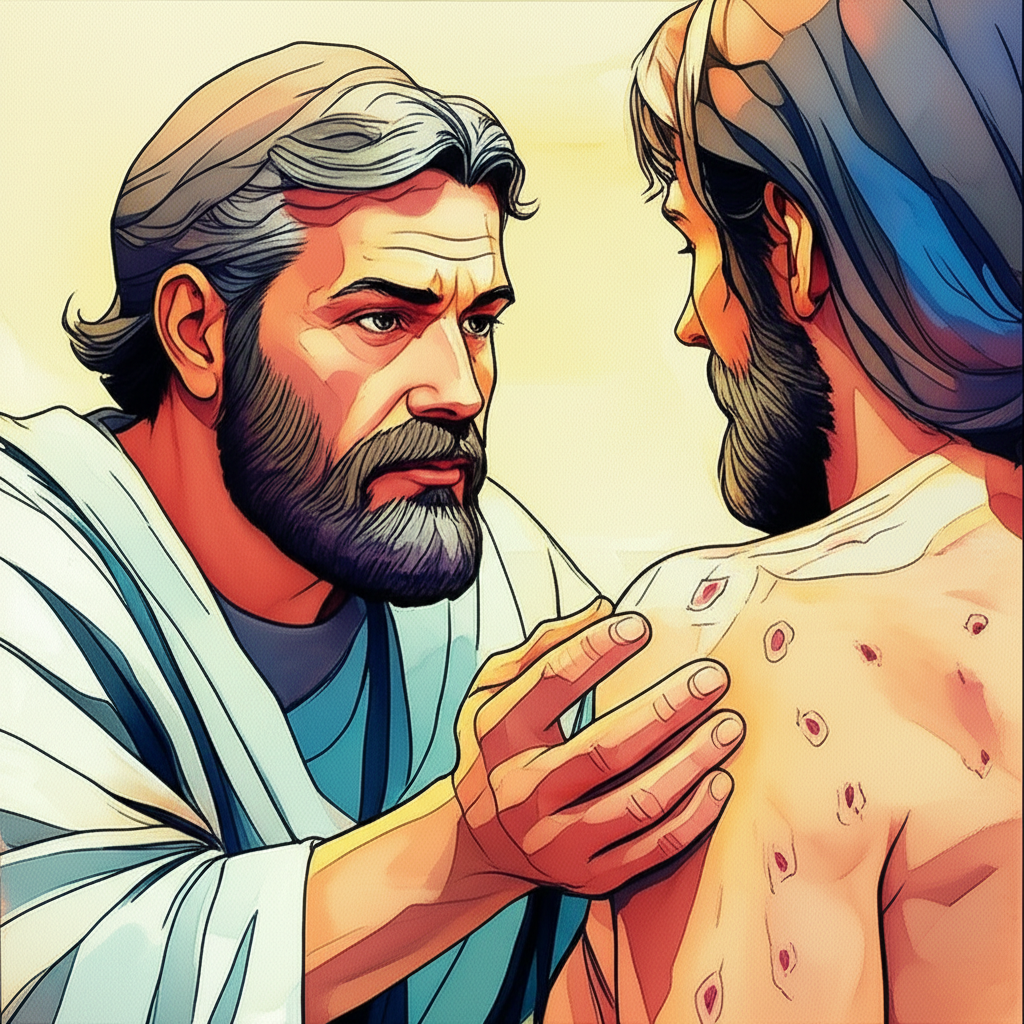
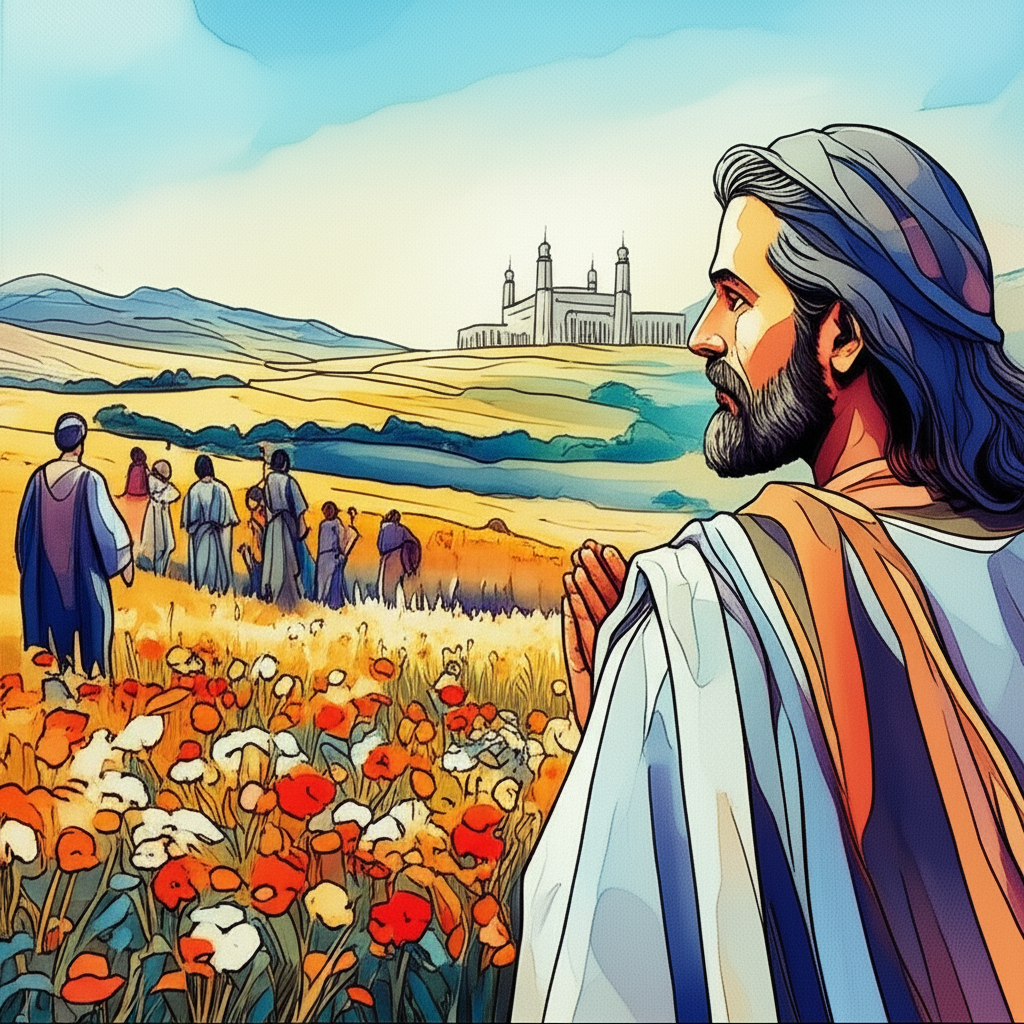

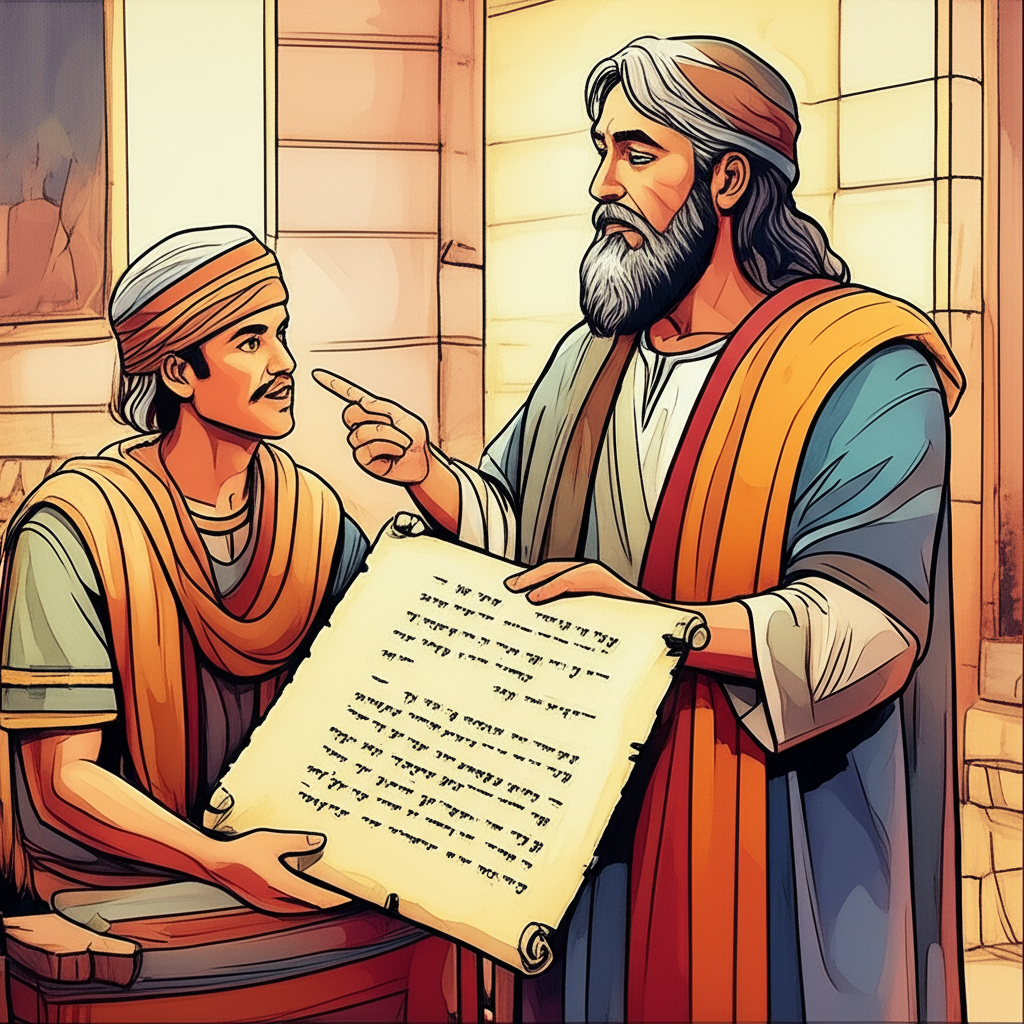
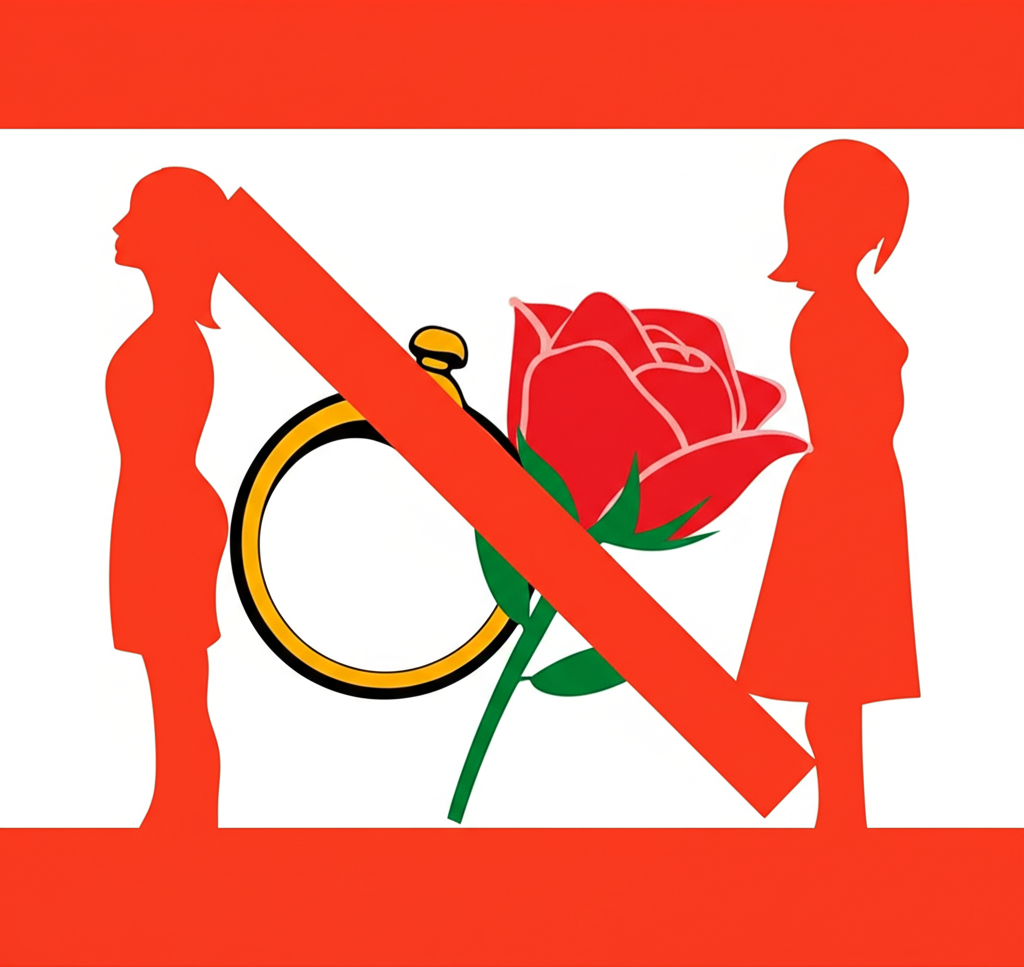
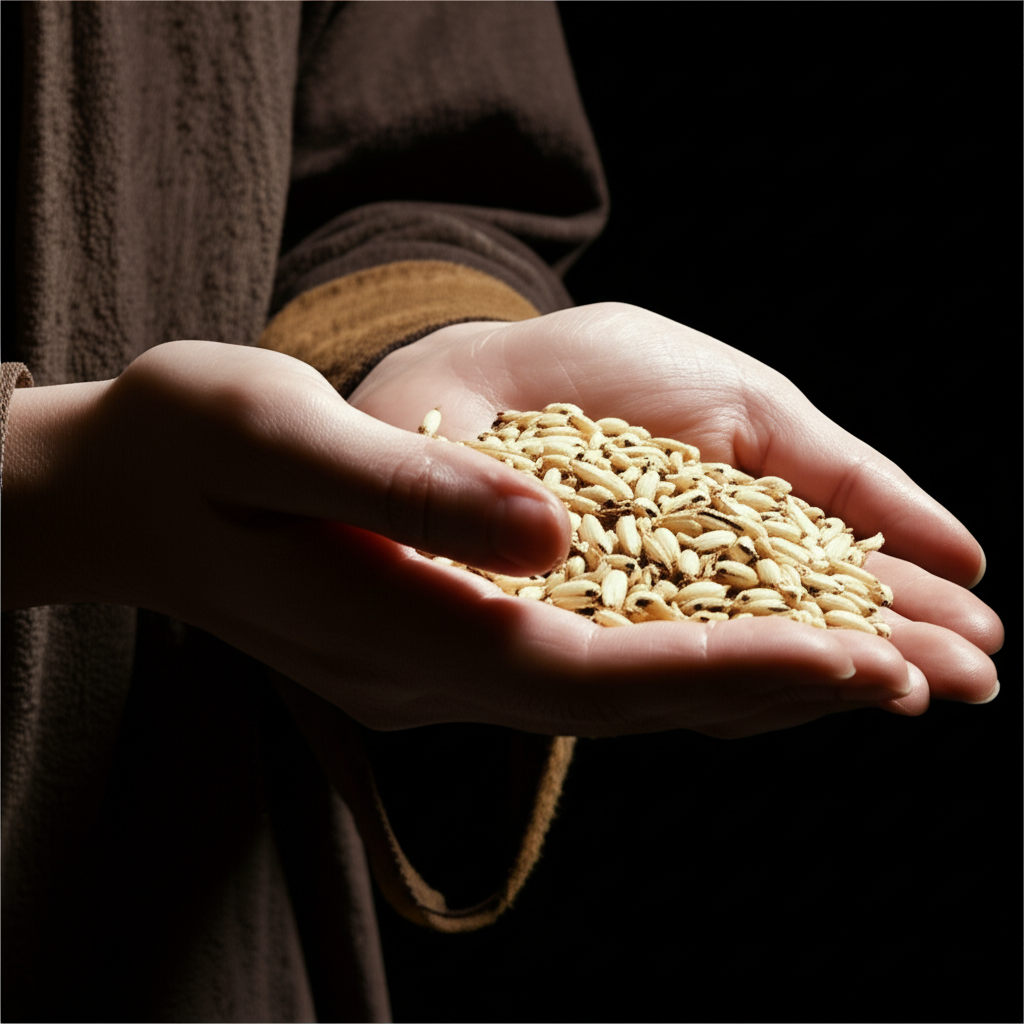
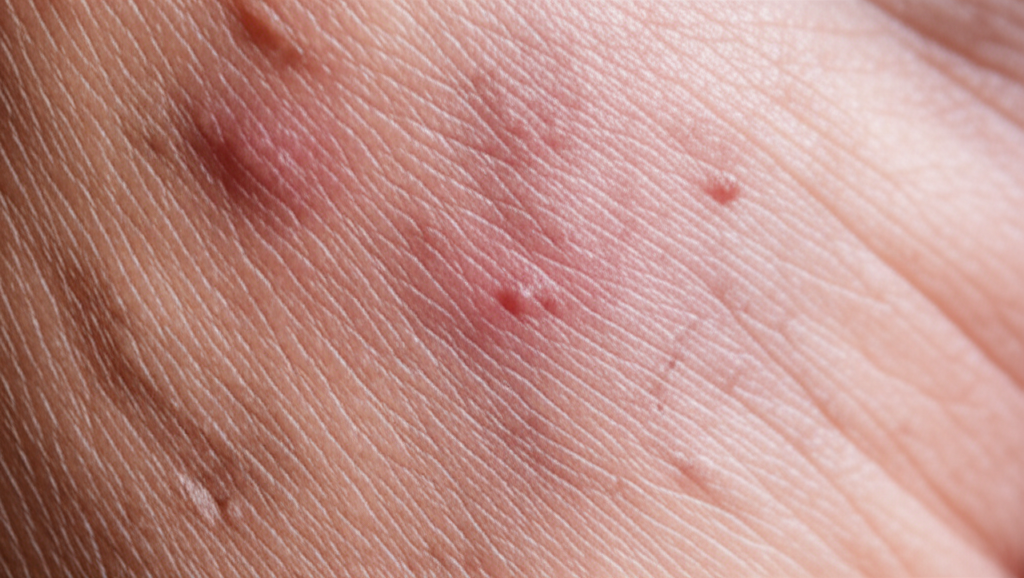
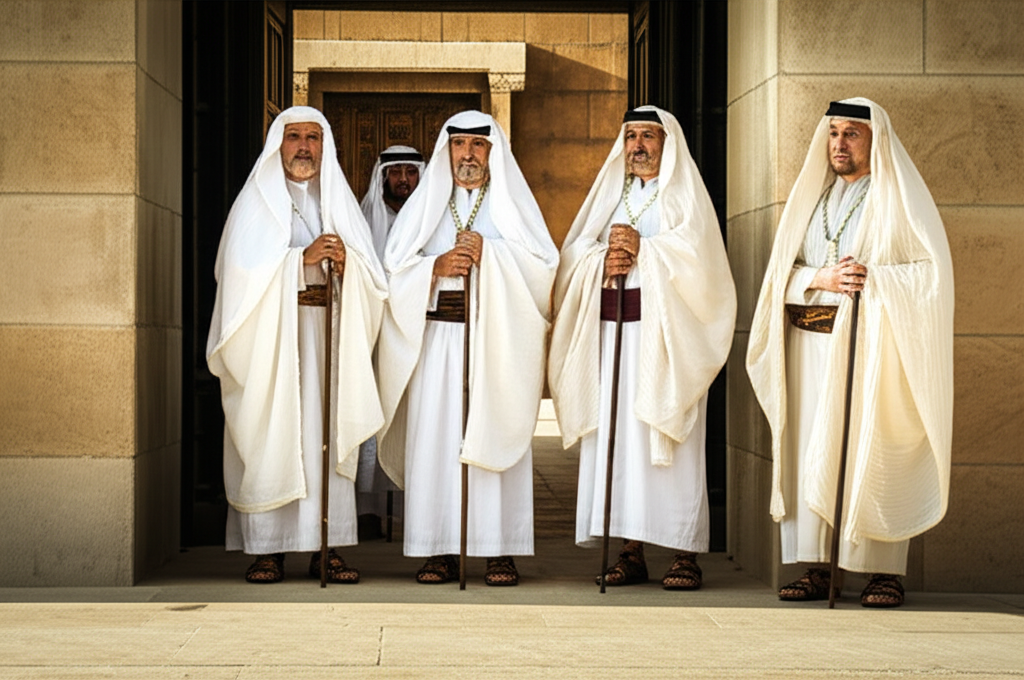
Leviticus chapter 21 kjv
- 1 And the LORD said unto Moses, Speak unto the priests the sons of Aaron, and say unto them, There shall none be defiled for the dead among his people:
- 2 But for his kin, that is near unto him, that is, for his mother, and for his father, and for his son, and for his daughter, and for his brother.
- 3 And for his sister a virgin, that is nigh unto him, which hath had no husband; for her may he be defiled.
- 4 But he shall not defile himself, being a chief man among his people, to profane himself.
- 5 They shall not make baldness upon their head, neither shall they shave off the corner of their beard, nor make any cuttings in their flesh.
- 6 They shall be holy unto their God, and not profane the name of their God: for the offerings of the LORD made by fire, and the bread of their God, they do offer: therefore they shall be holy.
- 7 They shall not take a wife that is a whore, or profane; neither shall they take a woman put away from her husband: for he is holy unto his God.
- 8 Thou shalt sanctify him therefore; for he offereth the bread of thy God: he shall be holy unto thee: for I the LORD, which sanctify you, am holy.
- 9 And the daughter of any priest, if she profane herself by playing the whore, she profaneth her father: she shall be burnt with fire.
- 10 And he that is the high priest among his brethren, upon whose head the anointing oil was poured, and that is consecrated to put on the garments, shall not uncover his head, nor rend his clothes;
- 11 Neither shall he go in to any dead body, nor defile himself for his father, or for his mother;
- 12 Neither shall he go out of the sanctuary, nor profane the sanctuary of his God; for the crown of the anointing oil of his God is upon him: I am the LORD.
- 13 And he shall take a wife in her virginity.
- 14 A widow, or a divorced woman, or profane, or an harlot, these shall he not take: but he shall take a virgin of his own people to wife.
- 15 Neither shall he profane his seed among his people: for I the LORD do sanctify him.
- 16 And the LORD spake unto Moses, saying,
- 17 Speak unto Aaron, saying, Whosoever he be of thy seed in their generations that hath any blemish, let him not approach to offer the bread of his God.
- 18 For whatsoever man he be that hath a blemish, he shall not approach: a blind man, or a lame, or he that hath a flat nose, or any thing superfluous,
- 19 Or a man that is broken-footed, or broken-handed,
- 20 Or crookbacked, or a dwarf, or that hath a blemish in his eye, or be scurvy, or scabbed, or hath his stones broken;
- 21 No man that hath a blemish of the seed of Aaron the priest shall come nigh to offer the offerings of the LORD made by fire: he hath a blemish; he shall not come nigh to offer the bread of his God.
- 22 He shall eat the bread of his God, both of the most holy, and of the holy.
- 23 Only he shall not go in unto the vail, nor come nigh unto the altar, because he hath a blemish; that he profane not my sanctuaries: for I the LORD do sanctify them.
- 24 And Moses told it unto Aaron, and to his sons, and unto all the children of Israel.
Leviticus chapter 21 nkjv
- 1 And the LORD said to Moses, "Speak to the priests, the sons of Aaron, and say to them: 'None shall defile himself for the dead among his people,
- 2 except for his relatives who are nearest to him: his mother, his father, his son, his daughter, and his brother;
- 3 also his virgin sister who is near to him, who has had no husband, for her he may defile himself.
- 4 Otherwise he shall not defile himself, being a chief man among his people, to profane himself.
- 5 'They shall not make any bald place on their heads, nor shall they shave the edges of their beards nor make any cuttings in their flesh.
- 6 They shall be holy to their God and not profane the name of their God, for they offer the offerings of the LORD made by fire, and the bread of their God; therefore they shall be holy.
- 7 They shall not take a wife who is a harlot or a defiled woman, nor shall they take a woman divorced from her husband; for the priest is holy to his God.
- 8 Therefore you shall consecrate him, for he offers the bread of your God. He shall be holy to you, for I the LORD, who sanctify you, am holy.
- 9 The daughter of any priest, if she profanes herself by playing the harlot, she profanes her father. She shall be burned with fire.
- 10 'He who is the high priest among his brethren, on whose head the anointing oil was poured and who is consecrated to wear the garments, shall not uncover his head nor tear his clothes;
- 11 nor shall he go near any dead body, nor defile himself for his father or his mother;
- 12 nor shall he go out of the sanctuary, nor profane the sanctuary of his God; for the consecration of the anointing oil of his God is upon him: I am the LORD.
- 13 And he shall take a wife in her virginity.
- 14 A widow or a divorced woman or a defiled woman or a harlot?these he shall not marry; but he shall take a virgin of his own people as wife.
- 15 Nor shall he profane his posterity among his people, for I the LORD sanctify him.' "
- 16 And the LORD spoke to Moses, saying,
- 17 "Speak to Aaron, saying: 'No man of your descendants in succeeding generations, who has any defect, may approach to offer the bread of his God.
- 18 For any man who has a defect shall not approach: a man blind or lame, who has a marred face or any limb too long,
- 19 a man who has a broken foot or broken hand,
- 20 or is a hunchback or a dwarf, or a man who has a defect in his eye, or eczema or scab, or is a eunuch.
- 21 No man of the descendants of Aaron the priest, who has a defect, shall come near to offer the offerings made by fire to the LORD. He has a defect; he shall not come near to offer the bread of his God.
- 22 He may eat the bread of his God, both the most holy and the holy;
- 23 only he shall not go near the veil or approach the altar, because he has a defect, lest he profane My sanctuaries; for I the LORD sanctify them.' "
- 24 And Moses told it to Aaron and his sons, and to all the children of Israel.
Leviticus chapter 21 niv
- 1 The LORD said to Moses, "Speak to the priests, the sons of Aaron, and say to them: 'A priest must not make himself ceremonially unclean for any of his people who die,
- 2 except for a close relative, such as his mother or father, his son or daughter, his brother,
- 3 or an unmarried sister who is dependent on him since she has no husband?for her he may make himself unclean.
- 4 He must not make himself unclean for people related to him by marriage, and so defile himself.
- 5 "?'Priests must not shave their heads or shave off the edges of their beards or cut their bodies.
- 6 They must be holy to their God and must not profane the name of their God. Because they present the food offerings to the LORD, the food of their God, they are to be holy.
- 7 "?'They must not marry women defiled by prostitution or divorced from their husbands, because priests are holy to their God.
- 8 Regard them as holy, because they offer up the food of your God. Consider them holy, because I the LORD am holy?I who make you holy.
- 9 "?'If a priest's daughter defiles herself by becoming a prostitute, she disgraces her father; she must be burned in the fire.
- 10 "?'The high priest, the one among his brothers who has had the anointing oil poured on his head and who has been ordained to wear the priestly garments, must not let his hair become unkempt or tear his clothes.
- 11 He must not enter a place where there is a dead body. He must not make himself unclean, even for his father or mother,
- 12 nor leave the sanctuary of his God or desecrate it, because he has been dedicated by the anointing oil of his God. I am the LORD.
- 13 "?'The woman he marries must be a virgin.
- 14 He must not marry a widow, a divorced woman, or a woman defiled by prostitution, but only a virgin from his own people,
- 15 so that he will not defile his offspring among his people. I am the LORD, who makes him holy.'?"
- 16 The LORD said to Moses,
- 17 "Say to Aaron: 'For the generations to come none of your descendants who has a defect may come near to offer the food of his God.
- 18 No man who has any defect may come near: no man who is blind or lame, disfigured or deformed;
- 19 no man with a crippled foot or hand,
- 20 or who is a hunchback or a dwarf, or who has any eye defect, or who has festering or running sores or damaged testicles.
- 21 No descendant of Aaron the priest who has any defect is to come near to present the food offerings to the LORD. He has a defect; he must not come near to offer the food of his God.
- 22 He may eat the most holy food of his God, as well as the holy food;
- 23 yet because of his defect, he must not go near the curtain or approach the altar, and so desecrate my sanctuary. I am the LORD, who makes them holy.'?"
- 24 So Moses told this to Aaron and his sons and to all the Israelites.
Leviticus chapter 21 esv
- 1 And the LORD said to Moses, "Speak to the priests, the sons of Aaron, and say to them, No one shall make himself unclean for the dead among his people,
- 2 except for his closest relatives, his mother, his father, his son, his daughter, his brother,
- 3 or his virgin sister (who is near to him because she has had no husband; for her he may make himself unclean).
- 4 He shall not make himself unclean as a husband among his people and so profane himself.
- 5 They shall not make bald patches on their heads, nor shave off the edges of their beards, nor make any cuts on their body.
- 6 They shall be holy to their God and not profane the name of their God. For they offer the LORD's food offerings, the bread of their God; therefore they shall be holy.
- 7 They shall not marry a prostitute or a woman who has been defiled, neither shall they marry a woman divorced from her husband, for the priest is holy to his God.
- 8 You shall sanctify him, for he offers the bread of your God. He shall be holy to you, for I, the LORD, who sanctify you, am holy.
- 9 And the daughter of any priest, if she profanes herself by whoring, profanes her father; she shall be burned with fire.
- 10 "The priest who is chief among his brothers, on whose head the anointing oil is poured and who has been consecrated to wear the garments, shall not let the hair of his head hang loose nor tear his clothes.
- 11 He shall not go in to any dead bodies nor make himself unclean, even for his father or for his mother.
- 12 He shall not go out of the sanctuary, lest he profane the sanctuary of his God, for the consecration of the anointing oil of his God is on him: I am the LORD.
- 13 And he shall take a wife in her virginity.
- 14 A widow, or a divorced woman, or a woman who has been defiled, or a prostitute, these he shall not marry. But he shall take as his wife a virgin of his own people,
- 15 that he may not profane his offspring among his people, for I am the LORD who sanctifies him."
- 16 And the LORD spoke to Moses, saying,
- 17 "Speak to Aaron, saying, None of your offspring throughout their generations who has a blemish may approach to offer the bread of his God.
- 18 For no one who has a blemish shall draw near, a man blind or lame, or one who has a mutilated face or a limb too long,
- 19 or a man who has an injured foot or an injured hand,
- 20 or a hunchback or a dwarf or a man with a defect in his sight or an itching disease or scabs or crushed testicles.
- 21 No man of the offspring of Aaron the priest who has a blemish shall come near to offer the LORD's food offerings; since he has a blemish, he shall not come near to offer the bread of his God.
- 22 He may eat the bread of his God, both of the most holy and of the holy things,
- 23 but he shall not go through the veil or approach the altar, because he has a blemish, that he may not profane my sanctuaries, for I am the LORD who sanctifies them."
- 24 So Moses spoke to Aaron and to his sons and to all the people of Israel.
Leviticus chapter 21 nlt
- 1 The LORD said to Moses, "Give the following instructions to the priests, the descendants of Aaron. "A priest must not make himself ceremonially unclean by touching the dead body of a relative.
- 2 The only exceptions are his closest relatives ? his mother or father, son or daughter, brother,
- 3 or his virgin sister who depends on him because she has no husband.
- 4 But a priest must not defile himself and make himself unclean for someone who is related to him only by marriage.
- 5 "The priests must not shave their heads or trim their beards or cut their bodies.
- 6 They must be set apart as holy to their God and must never bring shame on the name of God. They must be holy, for they are the ones who present the special gifts to the LORD, gifts of food for their God.
- 7 "Priests may not marry a woman defiled by prostitution, and they may not marry a woman who is divorced from her husband, for the priests are set apart as holy to their God.
- 8 You must treat them as holy because they offer up food to your God. You must consider them holy because I, the LORD, am holy, and I make you holy.
- 9 "If a priest's daughter defiles herself by becoming a prostitute, she also defiles her father's holiness, and she must be burned to death.
- 10 "The high priest has the highest rank of all the priests. The anointing oil has been poured on his head, and he has been ordained to wear the priestly garments. He must never leave his hair uncombed or tear his clothing.
- 11 He must not defile himself by going near a dead body. He may not make himself ceremonially unclean even for his father or mother.
- 12 He must not defile the sanctuary of his God by leaving it to attend to a dead person, for he has been made holy by the anointing oil of his God. I am the LORD.
- 13 "The high priest may marry only a virgin.
- 14 He may not marry a widow, a woman who is divorced, or a woman who has defiled herself by prostitution. She must be a virgin from his own clan,
- 15 so that he will not dishonor his descendants among his clan, for I am the LORD who makes him holy."
- 16 Then the LORD said to Moses,
- 17 "Give the following instructions to Aaron: In all future generations, none of your descendants who has any defect will qualify to offer food to his God.
- 18 No one who has a defect qualifies, whether he is blind, lame, disfigured, deformed,
- 19 or has a broken foot or arm,
- 20 or is hunchbacked or dwarfed, or has a defective eye, or skin sores or scabs, or damaged testicles.
- 21 No descendant of Aaron who has a defect may approach the altar to present special gifts to the LORD. Since he has a defect, he may not approach the altar to offer food to his God.
- 22 However, he may eat from the food offered to God, including the holy offerings and the most holy offerings.
- 23 Yet because of his physical defect, he may not enter the room behind the inner curtain or approach the altar, for this would defile my holy places. I am the LORD who makes them holy."
- 24 So Moses gave these instructions to Aaron and his sons and to all the Israelites.
- Bible Book of Leviticus
- 1 Laws for Burnt Offerings
- 2 Laws for Grain Offerings
- 3 Laws for Peace Offerings
- 4 Sacrifies for Sin
- 5 Laws for Guilt Offerings
- 6 The Priests and the Offerings
- 7 Law of the trespass offering
- 8 Consecration of Aaron and His Sons
- 9 The Lord Accepts Aaron's Offering
- 10 The Death of Nadab and Abihu
- 11 Clean and unclean Animals
- 12 Purification After Childbirth
- 13 Laws About Leprosy
- 14 Laws for Cleansing Lepers
- 15 Sperm Discharge and Menstruation cycle
- 16 Day of Atonement
- 17 The Place of Sacrifice
- 18 Unlawful Sexual Relations
- 19 Levitical Laws for Levites
- 20 Punishment for Child Sacrifice
- 21 Holiness and the Priests
- 22 Acceptable Offerings
- 23 The Feasts of the Lord
- 24 The Lamps
- 25 Year of Jubilee
- 26 Blessings for Obedience
- 27 Laws About Vows